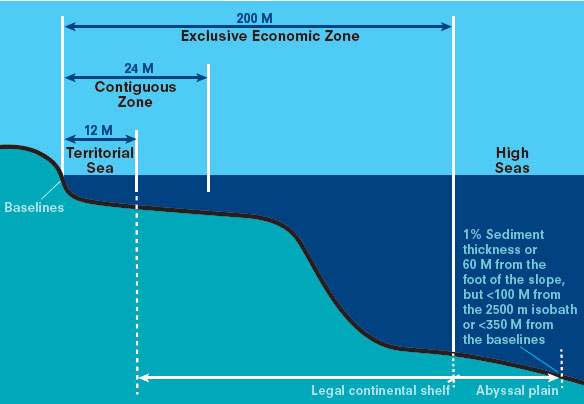US Patrol in India’s EEZ | 10 Apr 2021
Why in News
Recently, India protested against the US decision to conduct a patrol in the Indian Exclusive Economic Zone (EEZ) in the western Indian Ocean, rejecting the US’ claim that India’s domestic maritime law was in violation of international law.
Key Points
- Issue:
- About:
- The US Seventh Fleet announced that one of its warships, USS John Paul Jones (DDG 53), had carried out a Freedom of Navigation Operation (FONOP) west of Lakshadweep Islands, inside India’s EEZ, without requesting India’s prior consent, consistent with international law.
- Seventh Fleet:
- It is the largest of the US Navy’s forward deployed fleets.
- India had a close encounter with the 7th fleet during the 1971 war with Pakistan.
- Freedom of Navigation Operations (FONOP):
- It involves passages conducted by the US Navy through waters claimed by coastal nations as their exclusive territory.
- It reaffirms the US policy of exercising and asserting its navigation and overflight rights and freedoms around the world.
- This communicates that the US does not accept the excessive maritime claims of other nations, and thus prevents those claims from becoming accepted in international law.
- This is the first time the US Navy has issued a public statement giving details of the operation.
- About:
- US’ Stand:
- India requires prior consent for military exercises or maneuvers in its EEZ or continental shelf.
- India’s claim to EEZ is inconsistent with international law (United Nations Convention on the Law of the Sea 1982).
- FONOP upheld the rights, freedoms, and lawful uses of the sea recognized in international law by challenging India’s excessive maritime claims.
- India’s Protest:
- India’s stated position on the United Nations Convention on the Law of the Sea (UNCLOS) is that the Convention does not authorise other States to carry out in the EEZ and on the continental shelf, military exercises or manoeuvres, in particular those involving the use of weapons or explosives, without the consent of the coastal state.
- It is only when it is “military manoeuvres” in Indian EEZ that nations need to seek India’s permission and not if they are simply transiting through.
- The term military manoeuvres is not defined anywhere.
- Seventh Fleet to carry out FON missions in Indian EEZ in violation of Indian domestic law (Territorial Waters, Continental Shelf, Exclusive Economic Zone and Other Maritime Zones Act, 1976).
United Nations Convention on the Law of the Sea 1982
- About:
- The UNCLOS is an international treaty that provides a regulatory framework for the use of the world’s seas and oceans.
- It lays down a comprehensive regime of law and order in the world's oceans and seas establishing rules governing all uses of the oceans and their resources.
- It enshrines the notion that all problems of ocean space are closely interrelated and need to be addressed as a whole.
- Ratification:
- The Convention was opened for signature in December 1982 in Montego Bay, Jamaica.
- The Convention entered into force in accordance with its article 308 in November 1994, 12 months after the date of deposit of the sixtieth instrument of ratification or accession.
- Today, it is the globally recognized regime dealing with all matters relating to the law of the sea.
- The convention has been ratified by 168 parties, which includes 167 states (164 United Nations (UN) member states plus the UN Observer state Palestine, as well as the Cook Islands and Niue) and the European Union. An additional 14 UN member states have signed, but not ratified the convention.
- While India ratified UN Law of the Seas in 1995, the US has failed to do it so far.
- Exclusive Economic Zone
- According to UNCLOS, the EEZ is an area beyond and adjacent to the territorial sea, subject to the specific legal regime under which the rights and jurisdiction of the coastal State and the rights and freedoms of other States are governed by the relevant provisions of this Convention.
- It is defined as generally extending 200 nautical miles from shore, within which the coastal state has the right to explore and exploit, and the responsibility to conserve and manage, both living and non-living resources.
Indian Law
- As per India’s Territorial Waters, Continental Shelf, Exclusive Economic Zone and Other Maritime Zones Act, 1976:
- The EEZ of India is an area beyond and adjacent to the territorial waters, and the limit of such zone is two hundred nautical miles from the baseline.
- India’s limit of the territorial waters is the line every point of which is at a distance of twelve nautical miles from the nearest point of the appropriate baseline.
- All foreign ships (other than warships including sub-marines and other underwater vehicles) shall enjoy the right of innocent passage through the territorial waters.
- Innocent passage: It is the passage that is not prejudicial to the peace, good order or security of India.

